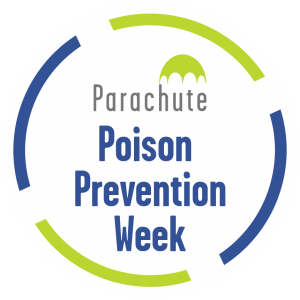
National Poison Prevention Week campaign focuses on children and cannabis
This page was last reviewed on March 12, 2020
Launching March 15 to 21, Parachute will be raising awareness about how to prevent children from inadvertently consuming cannabis products.
March 12, 2020 (Toronto, Ontario) – While almost all Canadian parents who use cannabis agree it’s their responsibility to safely store their cannabis products, only one in four do so properly.
That’s among many findings of a recent national Ipsos survey commissioned by Parachute, Canada’s national charity dedicated to injury prevention.
“Cannabis products should be in a child-resistant container or package, stored in a locked compartment, drawer, or cupboard,” says Pamela Fuselli, CEO and President, Parachute. “They should be out of sight and out of reach.”
The use of cannabis products in Canada has increased following cannabis legalization in 2018 and the country’s poison control centres have been fielding increased calls related to potential cannabis-related poisonings.
Children are more vulnerable to cannabis poisoning due to their small body size and weight, making them more sensitive to chemicals in cannabis. In particular, edible cannabis can have a stronger, more prolonged effect on the body than other forms. Ingestion of cannabis is the most common cause of cannabis poisoning in children.Edible cannabis can often resemble the appearance of common snacks (e.g., cookies, brownies, gummy candies), and a young child may be unable to tell the difference and unknowingly consume a large amount.
Poison Prevention Week from March 15 to 21 will also be the start of a national public awareness campaign on safe storage of cannabis products, supported by Health Canada. Using the theme #HighAndLocked, the campaign will use memorable imagery of a cannabis edible locked to “high places” to drive home the safety messaging.
The Ipsos survey also found that only 40 per cent of all parents surveyed knew about the poison control resources in their area. “Remember to keep your local poison centre phone number stored in your cellphone or in a visible location, such as on your fridge,” Fuselli recommends.
Check out our Poison Prevention Week resources: Parachute.ca/PoisonPreventionWeek
“I applaud Parachute’s efforts in carrying out a national, evidence-based public education campaign on how adults can help prevent accidental consumption of cannabis products. The Government of Canada has implemented strict rules under the Cannabis Act to minimize the appeal of cannabis products to young people and to decrease the risks of accidental consumption, in part through child-resistant and plain packaging requirements.”
The Honourable Patty Hajdu, P.C., M.P.
Minister of Health
This program is made possible through a financial contribution from Health Canada; the views expressed herein do not necessarily represent the views of Health Canada.
About Parachute
Parachute is Canada’s national charity dedicated to reducing the devastating impact of preventable injuries. Injury is the No. 1 killer of Canadians aged 1 to 34, where on average one child dies every day due to injury. Through education and advocacy, Parachute is working to save lives and create a Canada free of serious injuries. For more information, visit us at parachute.ca and follow us on Twitter, Facebook, Instagram and LinkedIn.
About the Ispos survey
The survey, conducted Nov. 25 to Dec. 2, 2019 was completed by 1,000 parents in Canada with half surveyed being cannabis users. Survey data was weighted to geography, gender and cannabis use. Credibility interval at the total level is +/-3.5%, +/-5.0% among users and non-users.
– 30 –
Media Contact and for more information about the Ipsos survey:
Kelley Teahen
Vice President, Communications and Marketing, Parachute
media@parachute.ca
647-776-5128